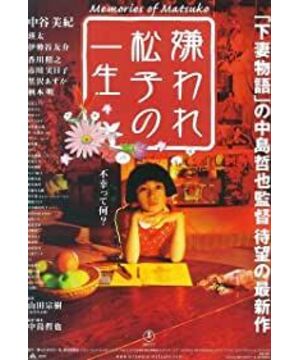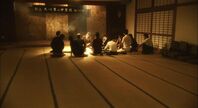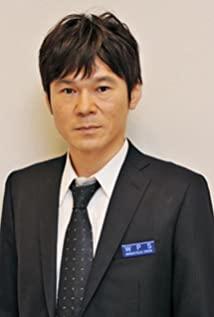The protagonist Matsuko lacked his father's love since he was a child. In order to get his father's love, he pretended to make a face. He liked one man after another in his life, but ended up with a down-and-out life. In this sense, the entire film seems to be seen as a rewrite of Disqualification on Earth. - In fact, I think it is "reverse", not "rewrite". I want to say bluntly: "The Life of the Disgusted Matsuko" is the salvation of "Disqualification in the World". Matsuko's great life transcended both comedy and tragedy.
It seems to pay tribute to "Disqualification in the World". In the film, a writer called the reincarnation of Osamu Dazai was arranged as one of Matsuko's boyfriends, and Matsuko also committed murder and decided to commit suicide at the place where Osamu Dazai threw himself into the river. -Unfortunately, the water is too shallow. Too Shallow Water: Suicide? To imitate Dazai Osamu to end his own life? Martyrdom under the weight of life? Cut the crap! It can be said that the "kitsch" mocked by Kundera in "The Unbearable Lightness of Life" - seeing a group of children running and thinking of "innocence", seeing soldiers charging into battle, thinking of various "isms" - the same It has also become the biggest obstacle preventing the audience from approaching the pine nuts.
On the level of daily life, Matsuko's life was tragic. She is not good at words, has no ideals, is rude and insists on her own way. From one man to another, Matsuko is always looking forward to the good love and stable life that people usually expect, but every time things don't go as expected. But at the same time, the movie also asks Songzi's nephew and Songzi's last boyfriend Long to say the following words: People like aunts who always love others and always give for others make people believe that there is a god . And almost to point the point, the nephew's little girlfriend also clearly said: the value of life in this world is not how much you get, but how much you give for others.
However, qualities such as "serving the people" and "doing nothing for oneself and benefiting others" seem to be irrelevant to Matsuko's life. People will say that she just doesn't know how to love someone, she just can't tell the difference between a good man... Not to mention the last trump card: love is selfish, there is no love that only asks for something in return. At the end of the day, one can ask: Would you say this life is worth living? Ask yourself, if it were you, would you be willing?
I don't think anyone would want to. One would probably say that none of us want to be as reckless as Pine (some even say a "character flaw") - she's just being carried away by love. Indeed, a convenient explanation is given in the movie: because Matsuko lacked fatherly love when she was a child, she especially needed the care of men, and she couldn't even judge whether this relationship was worth it or whether it was reasonable for her future plans.
However, the above explanation, in my opinion, is not so much a post-view of the film, but rather a post-reading of a social report, as if there is really such an unfortunate woman as Matsuko, who has experienced so many emotional failures Life was a complete failure afterward. As if it were a documentary. ——Is "The Life of the Disgusted Matsuko" a persuasive text?
If pine nuts really tell us anything, it is by no means what an explanation like the one above would convey. While the whole play looks like a tragedy, almost every frame of the film is bright: Matsuko's world is full of betrayal, hurt, betrayal, but also bright colors and flowing singing. If there is anything pine nuts represent, it represents life as a constantly flowing force, life as force itself: life is not "for" any purpose - such as a well-off family with a house and a car, such as a family in which all A society in which everyone has equal access to basic rights and is equally given the freedom to exercise their various abilities - the "means" of existence. Life is constant self-enrichment and self-expansion; life is a means without an end.
Like Faust who made a pact with the devil, Matsuko did not stop her pursuit at the moment of her death: as a power, she was so pure that she wanted to cut off the ties with her family and wander aimlessly. At the same time, as a pure strength, she is invincible, she can experience setbacks and despair again and again, and then stand up again and again. Even after Matsuko finally lived a life of self-defeating, the occasional business card she got was enough to rekindle her hope in life. Matsuko's death was an accidental death, an absurd death: she did not die vigorously, and there was no special "reason" that led to her death. But the absurdity of pine nuts is not the absurdity of daily life itself, but the absurdity of when the unstoppable power of life is manifested in a limited body. Matsuko can only die in an accidental, unprovoked way, not because her life was so miserable, but because her life was so great, and her vitality was vast - a narrow movie by comparison The narrative can only end there.
Matsuko is not a "typical character" of classical realism, much less a "model character", just as Faust is not a hero of realistic literary representation. People can be destroyed, but they cannot be defeated: Matsuko's repeated failures in emotional experience are precisely the power to will - if I have failed 10,000 times, then let me try the 10,000th time . As long as life does not come to an end, the door to "possibility" is always open. Although or just because of the countless decisive moths to the flames that have ended in failure, I believe that next time I will definitely win.
Therefore, the annoying pine nuts can also be understood in an extraordinary sense: our weak souls cannot bear the pure and powerful power of pine nuts, and our fragile and sensitive nerves cannot bear the tragic life experienced by pine nuts. , while pine nuts go their own way on what we see as a depraved path. With its almost absurd greatness, Matsuko expounds a seemingly innocuous truth: life can be repeated, and it can be repeated over and over again. No one is destined for a tragedy - no, life is never tragic.
View more about Kiraware Matsuko no isshô reviews










